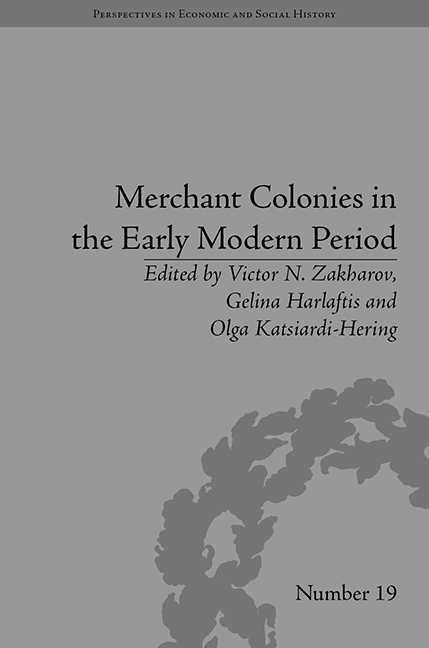Book contents
- Frontmatter
- Contents
- List of Figures and Tables
- List of Contributors
- Introduction
- 1 Early Modern English Merchant Colonies: Contexts and Functions
- 2 German and Italian Merchant Colonies in Early Modern England
- 3 Dynamism and Integration of the North European Merchant Communities in French Ports in the Eighteenth Century
- 4 Opportunity and Legislation: How the Armenians Entered Trade in Three Mediterranean Ports
- 5 Russian Merchant Colonies in Seventeenth-Century Sweden
- 6 Foreign Merchant Communities in Eighteenth-Century Russia
- 7 Greek Merchant Colonies in Central and South-Eastern Europe in the Eighteenth and Early Nineteenth Centuries
- 8 Community for Commerce: An Introduction to the Nezhin Greek Brotherhood Focusing on its Establishment as a Formal Institution in the Years Between 1692 and 1710
- 9 Entrepreneurship at the Russian Frontier of International Trade. The Greek Merchant Community/Paroikia of Taganrog in the Sea of Azov, 1780s–1830s
- Notes
- Index
5 - Russian Merchant Colonies in Seventeenth-Century Sweden
- Frontmatter
- Contents
- List of Figures and Tables
- List of Contributors
- Introduction
- 1 Early Modern English Merchant Colonies: Contexts and Functions
- 2 German and Italian Merchant Colonies in Early Modern England
- 3 Dynamism and Integration of the North European Merchant Communities in French Ports in the Eighteenth Century
- 4 Opportunity and Legislation: How the Armenians Entered Trade in Three Mediterranean Ports
- 5 Russian Merchant Colonies in Seventeenth-Century Sweden
- 6 Foreign Merchant Communities in Eighteenth-Century Russia
- 7 Greek Merchant Colonies in Central and South-Eastern Europe in the Eighteenth and Early Nineteenth Centuries
- 8 Community for Commerce: An Introduction to the Nezhin Greek Brotherhood Focusing on its Establishment as a Formal Institution in the Years Between 1692 and 1710
- 9 Entrepreneurship at the Russian Frontier of International Trade. The Greek Merchant Community/Paroikia of Taganrog in the Sea of Azov, 1780s–1830s
- Notes
- Index
Summary
The centuries-long confrontation between Russia and Sweden – which by the late sixteenth century had clearly grown into a broader fight for supremacy in the Baltic space – has tended to eclipse the underappreciated reality of intensive commercial ties between the two rivals. Yet such relations were not only of very long standing but had centuries earlier effectively given rise to Russian statehood in the era of Kievan Rus'. Even in the early modern era, they continued to be of considerable importance for both countries, both at the level of the adjacent border regions and the broader context of the national economies. In spite of laudable efforts by writers such as Artur Attman, Helmut Piirimäe, and Igor' Shaskol'skii, even the historiography of early modern Russian foreign trade has tended to dwell above all on White Sea trade, which was triggered by the English Muscovy Company in the sixteenth century. Naturally, it was undoubtedly the Dutch commercial superpower of the era – assisted by north German and English merchants – that paved the way for Russia's economic integration in the broader European economy. Nonetheless, this remarkable success story never undermined or substituted for Russia's long-standing commercial relations with its geographic neighbours. While the remarkable rise of Arkhangelsk inevitably led to a decline in the relative importance of trade in the Baltic, trade with the ascendant Swedish realm constituted an important aspect of Russian trade policy throughout the seventeenth century.
- Type
- Chapter
- Information
- Merchant Colonies in the Early Modern Period , pp. 85 - 102Publisher: Pickering & ChattoFirst published in: 2014



